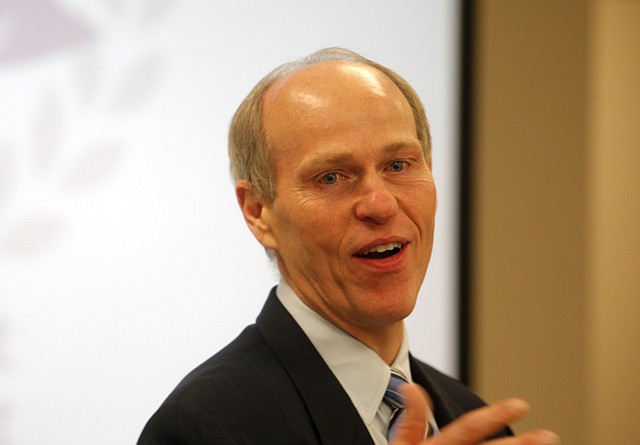Parker keeps Covenant through bumpy roads over 25 years
Wednesday, May 18, 2011
DID YOU KNOW?* David Parker, Chairman and CEO of Chattanooga-based Covenant Transport, is step brother to Max Fuller, co-chairman of Chattanooga-based U.S. Xpress, a competitor.* The two, along with U.S. Xpress co-chairman Pat Quinn, worked together at Southwest Motor Freight under Max Fuller's father Clyde Fuller, a car salesman turned trucking magnate who pioneered the cross-country, 48-hour team drive.* Covenant is publicly traded on the Nasdaq; U.S. Xpress delisted and went private at the end of 2007.* Covanant has attempted to stay the course with long-haul trucking, while U.S. Xpress has diversified into rail and other methods of transportation.Source: Covenant, U.S. Xpress
David Parker, outspoken chairman and CEO of Covenant Transport, founded his company at age of 28 with his wife, Jacqueline. It was a leap of faith.
"I was scared, because I was 28 years old and I was signing a $1 million line of credit," he said Tuesday at a company stockholders meeting.
Over the last quarter-century, the Parkers have grown the Chattanooga-based trucking and transportation interest into a $600 million-a-year corporation with about 5,000 employees, roughly 3,100 tractors and more than 8,000 trailers.
Parker has steered it through economic downturns and gas rationing while developing a reputation as an unabashed Christian in a dog-eat-dog industry.
"It's been a long, hard, joyful, wonderful emotional ride for the last 25 years," he said.
Like the trucking industry as a whole, Covenant has experienced its fair share of ups and downs, made all the more visible because the company is publicly traded, said Joey Hogan, senior executive vice president and chief operating officer.
"A lot of people wrote us off, but we're still here," he said. "It's the worst recession since the Great Depression, so for our organization to still be here and better than ever; that's been rewarding to me."
A long road
At a ceremony to honor Covenant's 25th year in operation, Parker told attendees the story of how a California earthquake once saved his company.
"I'll never forget having my credit cards maxed out," he reminisced with a smile. It was common during that period to find himself "getting a hold of the bank at 10 a.m. to find out how much money we had to come up with by 2 o'clock in the afternoon."
Around the same time, a 1989 temblor known as the World Series Earthquake hit San Francisco and took out a Union Oil tank farm there, he said.
"For two weeks, we never got a fuel bill," Parker said. "It probably brought us back."
In 2010, the company achieved profitability for the first full year since 2005, even while weathering increasing regulatory expenses, rising fuel costs and slipping demand for goods.
The five-year period during which the company lost tens of millions of dollars was one of the hardest in Parker's life, he said. But he isn't ready to declare victory yet.
"We've definitely turned the corner, but it's a slow recovery," he said. "Just when you think you've got some momentum, fuel prices go up."
Shares of Covenant Transport hit a low of $1.60 in 2009, but the company' stock has since risen to $9.34 at the market's close on Tuesday.
At its peak in May 1998, the stock traded as high as $21.90 per share.
The company made $3.3 million in 2010 off $546 million in revenue, compared with a loss of $25 million the prior year, and losses of $53 million and $16 million in 2008 and 2007, respectively.
"The [trucking] industry's been struggling the last couple years, just like everyone else," Parker said.
Hoop-jumping
Parker's job has been made harder by recent regulations that the federal government has said should increase safety and fuel economy.
"Our truck costs have gone up $30,000 in five years," he said. "When there was more supply than there was demand, they're raising the cost of operating. It drives me crazy; it's definitely anti-business."
The recession forced Covenant to retool its profit model to survive, seeking out new sources of revenue and finding ways to widen minuscule margins. But rules governing the number of hours drivers can work per day, and black boxes that track truckers' locations are threatening the recent gains Parker has made by tightening the company's belt in other areas, he said.
Even through the chaos of fighting shrinking margins on one side and regulators on the other, Parker hasn't lost sight of why he founded the company in the first place, said his son, Jonathan.
Jonathan Parker works in Covenant's body shop, which he's been doing off and on since age 13, he said.
"It really is about the faith," the younger Parker said.
Parker has given large amounts of money to community and religious organizations in Chattanooga and across the country, which is part of the reason for Covenant's existence, Jonathan Parker said.
His father has said that he founded the company after a week of praying, and having a conversation with God at Fall Creek Falls.
"We have a responsibility to the community, that's the core of what being a Christian is," Jonathan Parker said. "The business is sort of an extension of that."
